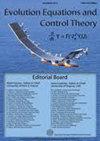一个控制力对耦合抛物热方程的倒向随机级联系统的可控性
IF 1.2
4区 数学
Q1 MATHEMATICS
引用次数: 1
摘要
This paper is devoted to the null controllability of a cascade system of \begin{document}$ m $\end{document} coupled backward stochastic heat equations governed by a unique distributed control force, where \begin{document}$ m\geq 2 $\end{document}. This task is obtained by means of proving a suitable observability estimate for the dual system of the controlled system.本文章由计算机程序翻译,如有差异,请以英文原文为准。
Controllability of a backward stochastic cascade system of coupled parabolic heat equations by one control force
This paper is devoted to the null controllability of a cascade system of
求助全文
通过发布文献求助,成功后即可免费获取论文全文。
去求助
来源期刊

Evolution Equations and Control Theory
MATHEMATICS, APPLIED-MATHEMATICS
CiteScore
3.10
自引率
6.70%
发文量
5
期刊介绍:
EECT is primarily devoted to papers on analysis and control of infinite dimensional systems with emphasis on applications to PDE''s and FDEs. Topics include:
* Modeling of physical systems as infinite-dimensional processes
* Direct problems such as existence, regularity and well-posedness
* Stability, long-time behavior and associated dynamical attractors
* Indirect problems such as exact controllability, reachability theory and inverse problems
* Optimization - including shape optimization - optimal control, game theory and calculus of variations
* Well-posedness, stability and control of coupled systems with an interface. Free boundary problems and problems with moving interface(s)
* Applications of the theory to physics, chemistry, engineering, economics, medicine and biology
 求助内容:
求助内容: 应助结果提醒方式:
应助结果提醒方式:


